Li Keqiang
Li Keqiang (/liː kəˈtʃjɑːŋ/;[1] Chinese: 李克强; Mandarin: [lì kʰɤ̂.tɕʰjǎŋ]; born 1 July 1955) is a Chinese politician who is the current Premier of the State Council of the People's Republic of China. An economist by profession, Li is China's head of government as well as one of the leading figures behind China's Financial and Economic Affairs, Foreign Affairs, National Security and Deepening Reforms. He is also the second-ranked member of the Politburo Standing Committee of the Communist Party of China, the de facto top decision-making body of the country. Li is a major part of the "fifth generation of Chinese leadership" along with General Secretary Xi Jinping. Li was named the world's 12th most powerful person by Forbes in their list of the world's most powerful people in 2015 and 2016.
His Excellency Li Keqiang | |
|---|---|
李克强 | |
.jpg) Li in November 2019 | |
| Premier of the People's Republic of China | |
| Assumed office 15 March 2013 | |
| Vice Premier | Cabinet I
Cabinet II
|
| Leader | Xi Jinping (Paramount leader) |
| Preceded by | Wen Jiabao |
| Vice Premier of the People's Republic of China | |
| In office 17 March 2008 – 15 March 2013 | |
| Premier | Wen Jiabao |
| Preceded by | Wu Yi (Acting) |
| Succeeded by | Zhang Gaoli |
| Communist Party Secretary of Liaoning | |
| In office December 2004 – October 2007 | |
| Deputy | Zhang Wenyue (Governor) |
| Preceded by | Wen Shizhen |
| Succeeded by | Zhang Wenyue |
| Communist Party Secretary of Henan | |
| In office December 2002 – December 2004 | |
| Deputy | Li Chengyu (Governor) |
| Preceded by | Chen Kuiyuan |
| Succeeded by | Xu Guangchun |
| First Secretary of the Communist Youth League of China | |
| In office May 1993 – June 1998 | |
| Preceded by | Song Defu |
| Succeeded by | Zhou Qiang |
| Personal details | |
| Born | 1 July 1955 Hefei, Anhui, China |
| Political party | Communist Party of China (1974–present) |
| Spouse(s) | Cheng Hong |
| Children | 1 |
| Residence | Zhongnanhai |
| Education | Peking University (LLB, PhD) |
| Cabinet | Li Keqiang Government |
| Awards | Nishan-e-Pakistan |
| Website | Premier Li Keqiang |
Central institution membership
Leading group posts
Other offices held
| |
| Li Keqiang | |||||||||||||||
|---|---|---|---|---|---|---|---|---|---|---|---|---|---|---|---|
.svg.png) Li's name in Simplified (top) and Traditional (bottom) Chinese characters | |||||||||||||||
| Simplified Chinese | 李克强 | ||||||||||||||
| Traditional Chinese | 李克強 | ||||||||||||||
| |||||||||||||||
Li rose through the ranks through his involvement in the Communist Youth League. From 1998 to 2004, Li served as the Governor of Henan and the province's party secretary. From 2004 to 2007 he served as the Party Secretary of Liaoning, the top political office in the province. From 2008 to 2013, Li served as the first-ranked Vice-Premier[note 1] under then-Premier Wen Jiabao, overseeing a broad portfolio which included economic development, price controls, finance, climate change, and macroeconomic management.[2]
Given his Youth League experience, Li has generally been considered a political ally of former leader Hu Jintao. Li assumed the post of Premier in 2013, and has facilitated the Chinese government's shifting of priorities from export-led growth to a greater focus on internal consumption. Li has also been a major force behind the implementation of the "comprehensively deepening reforms" announced in the fall of 2013. Made in China 2025 is a strategic plan issued by Li and his cabinet in May 2015.[3]
Early life and education
Li Keqiang was born on 1 July 1955 in Hefei, Anhui province. His father was a local official in Anhui.
Li graduated from Hefei No.8 Senior High School in 1974,[4] during the Cultural Revolution, and was sent for rural labour in Fengyang County, Anhui, where he eventually joined the Communist Party of China and made his way in becoming the party head of the local production team. He was awarded the honour of Outstanding Individual in the Study of Mao Zedong Thought during this time.[5] Li refused his father's offer of grooming him for the local county's party leadership and entered the School of Law at Peking University, where he received his LLB[6] and became the president of the university's student council. He earned a Doctor of Philosophy (PhD) in economics in 1995, and the prominent economist Li Yining (no relation) was his doctoral advisor. His doctoral dissertation was awarded the Sun Yefang Prize, China's highest prize in economics.[7]
In 1982, Li became the Communist Youth League secretary at Peking University.[8] He entered the top leadership of the national organization of the Communist Youth League (CYL) in 1983 as a member of its secretariat, and has worked closely with former Party General Secretary Hu Jintao, who also rose through the ranks of the CYL, ever since. Li became the organization's First Secretary in 1993 and served until 1998. He is a representative member of the first generation to have risen from the CYL leadership.
Rising through the ranks (1998-2012)
Provincial tenures
Li became the youngest Chinese provincial governor in June 1998 when he was appointed governor of Henan at the age of 43. According to provincial officials working with him at the time, Li refused to participate in any banquets or large fancy events not related to government activities.[9] During his time as governor, a public sense of his "bad luck" grew due to the occurrence of three major fires in the province.[10]
Li is known to be outspoken and led economic development in Henan, transforming the poor inland region into an attractive area for investment. Li did not spend time pursuing superficial projects. He trekked through all regions of the province trying to search for a comprehensive solution to its growing problems. Henan jumped in national GDP rankings from 28th in the early 1990s to 18th in 2004, when Li left Henan. However, his government was relatively ineffective at curbing the HIV/AIDS epidemic that was affecting the rural areas of the province.
Li was transferred to work as the Party Secretary in Liaoning in December 2004, taking on the top political office of the province. There he is known for the "Five-points to one Line" project, where he linked up Dalian and Dandong, as well as a series of other ports into a comprehensive network to improve trade flow.
With his Youth League experience and his association with then paramount leader Hu Jintao, Li was seen from early on in Hu's term as a contender to succeed Hu when his term as party leader ends in 2012. Li gained membership to the Politburo Standing Committee at 17th Party Congress held in October 2007. He was succeeded in his provincial party chief post by Governor Zhang Wenyue. While Li's political future seemed promising, he was outranked on the Standing Committee by Xi Jinping, who had just left his role as party chief of Shanghai to join the central leadership ranks in Beijing. This rank order ostensibly signaled that it would be Xi, not Li, who would eventually succeed Hu as party General Secretary and President. At the 2008 National People's Congress, Li was elected Vice-Premier, first in rank, reinforcing the speculation that Li would become Premier and was being groomed to succeed then-Premier Wen Jiabao.[10]
Vice Premiership (2008–2013)
.jpg)
During his first term in the PSC between 2007 and 2012, Li took on the most important portfolios in the Chinese government, including economic development, government budgets, land and resources, the environment, and health, ostensibly to prepare him for his upcoming premiership. He also became the head of central commissions overseeing the Three Gorges Dam and the South-North Water Transfer Project, as well as the leader of steering committees in charge of health care reform, food safety, and AIDS-related work. In addition, Li was the principal lieutenant to Premier Wen Jiabao in the broad portfolios of climate change, energy, information technology, northeastern China revitalization, and developing the Chinese far west.
Li's first major appearance internationally was at the 2010 World Economic Forum in Davos, Switzerland. The event was seen as a litmus test for Li. At the forum, Li succinctly presented China's long-term vision for development in front of world business and political leaders.[11] In particular, Li briefed the WEF on China's commitment to sustainable development, green energy, decreasing the income gap and modernizing key strategic industries.[11] While reiterating Beijing's commitment to peaceful development and its focus in increasing domestic demand in the face of external pressures during the global financial crisis, Li also warned against protectionism, saying "opening up can be both bilateral and multilateral... in this sense, one plus one is more often than not bigger than two." He also touched upon the importance of international development, and international financial reform. He called for a global governance structure that was "more reflective of the changes in the global political and economic landscape."[12]
In February 2010, Li gave a speech to ministerial and provincial-level leaders about the importance of changing the economic structure of the country in order to be better poised for future growth. The speech was published with minor omissions in the 1 June issue of Qiushi, the Communist Party's political theory publication. Li said that China had come to a critical historical inflection point where a fundamental shift in the structure of the economy must take place in order for the country to continue its path of growth. Li particularly emphasized the need to boost domestic consumption, and emphasized the importance of continued urbanization.[13] Li also emphasized that China should be moving towards a more middle class-oriented society with an "olive"-shaped wealth distribution, with the majority of the country's population and wealth belonging to the middle class.[14]
He has also reiterated the importance of industrialization, urbanization and agricultural modernization in China in order to improve its competitiveness, food security, energy security, affordable housing, and healthcare.[15]
In August 2011, Li went on an official visit to Hong Kong, including a trip to the University of Hong Kong. The political sensitivities and heightened security surrounding the event resulted in the Hong Kong 818 incident, an event that caused controversy in the territory.
At the 18th Party Congress held in the fall of 2012, Li was elevated to the number two spot on the Politburo Standing Committee (PSC) and thereby became one of the top leaders of China. As he was expected to become Premier, this was a shift from previous convention on the PSC set in 1997 whereby the Premier ranked third, after the Chairman of the Standing Committee of the National People's Congress, who ranked second. This change showed that the party intended to project Li as the number two figure in the Chinese political hierarchy, behind only party General Secretary Xi Jinping. Also in that same year, he had personally met with the openly gay Ma Baoli (a policeman turned businessman) to discuss the threat posed by HIV.[16] In the same conversation, they discussed LGBT issues on preventing discrimination which has been interpreted as a sign that the People's Republic is slowly coming around to the idea as major Chinese businesses have already begun tapping into the purchasing power of the LGBT community.[17]
Premiership (2013 to present)
.jpg)
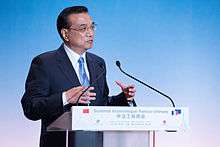
On 15 March 2013, Li Keqiang was, as expected, elected by the 12th National People's Congress as Premier.[18] At the same Congress, Party General Secretary Xi Jinping was elected President.[19] Li replaced Wen Jiabao, who retired after serving two terms as premier. Of the nearly 3,000 legislators assembled at the Congress, 2,940 voted for him, three against, and six abstained.[18] He was elected for a five-year term, but was expected to serve two terms like his predecessor Wen.[18]
On 16 March, the Congress selected Zhang Gaoli, Liu Yandong, Wang Yang, and Ma Kai as vice premiers following their respective nominations from Li Keqiang.[20] He gave his first major speech 17 March at the conclusion of the National People's Congress, calling for frugality in government, a fairer distribution of income and continued economic reform. Li has focused his attention on China to move towards a consumption based economy instead of relying on export led growth.[21][22] Li was ranked 14th of the 2013 Forbes Magazine's List of The World's Most Powerful People, after taking the office of Chinese Premier.[23]
Domestic policy
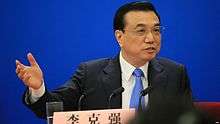
Li has an academic background in economics and is therefore a firm believer in the use of robust economic data to aid in government decision making. He is known to study economic statistics and routinely questions the reliability of the data he works with. Li has been described by international media as the pioneer behind the so-called "Keqiang index",[24] an unconventional economic measurement indicator devised by Li that was said to bypass the often unreliable official GDP numbers and thus serves as a better indicator of economic health and a more useful barometer for decision-making. Instead of gathering data on total economic output alone, Li used three other indicators to keep tabs on the economy while working in Liaoning province. These were, the railway cargo volume, electricity consumption and total loans disbursed by banks.
When Li initially entered office, China was facing numerous structural problems inherited from the previous administration. Namely, the large abundance of non-performing loans, that many of the giant infrastructure projects the country embarked on since the global financial crisis was overloaded with crushing debt and lower than expected revenues, and the increasingly large wealth gap. Under these circumstances, Li was said to have responded with what became known as "Likonomics", a term coined by economists at the investment bank Barclays Capital. Likonomics consisted of a three-prong approach that included the across-the-board reduction of debt, an end to massive stimulus practices of the Wen Jiabao government, and structural reforms.[25] However, by 2014, global economic pressures and a decrease in demand of Chinese exports led to lower than expected economic growth rates. Year-on-year GDP growth amounted to less than 7.5% for the first time since 1989. Li's government then responded with tax cuts for small businesses, renovation projects of poor urban areas, and another round of rail construction, particularly focused on the country's interior.[26]
After the announcement of comprehensive reforms at the Third Plenum in 2013, Li became a leading figure of the government's reform implementation efforts. The Third Plenum called for market forces to play a "decisive" role in the allocation of resources, ostensibly looking to decrease government regulation on the free market. In early 2014, Li said that local governments were still ineffective at following the central government's reform directives, and that some governments meddle in affairs they shouldn't be involved in, and some don't pay attention to things they should be doing. Li emphasized that the success of reforms came down to "execution and implementation," and criticized local governments for failing to act in support of reforms.[27]
Foreign affairs
Li Keqiang made his first foreign visit to India on 18 May 2013 in a bid to resolve border disputes and to stimulate economic relations.[28] He said the choice of India as the first international visit highlights Chinese importance in its relations with the country.[29] During Prime Minister Narendra Modi's visit to China in 2015, Li and Modi took a selfie together at the Temple of Heaven.
During his visit to Pakistan he met with top leadership of country and expressed his views "As Pakistan's closest friend and brother, we would like to provide as much assistance as we can for the Pakistani side".[30]
Li Keqiang also visited Switzerland and Germany on his first Europe trip, and met with the two countries' leaders.[31]
United States lieutenant general H. R. McMaster wrote of Li Keqiang that, "If anyone in the American group had any doubts about China's view of its relationship with the United States, Li's monologue would have removed them. He began with the observation that China, having already developed its industrial and technological base, no longer needed the United States."[32]
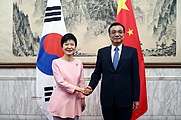 June 2013, Li meets the South Korean president Park Geun-hye.
June 2013, Li meets the South Korean president Park Geun-hye.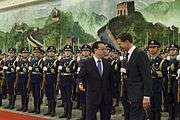 December 2013, Li meets the Dutch prime minister Mark Rutte.
December 2013, Li meets the Dutch prime minister Mark Rutte..jpg) February 2014, Li meets the United States Secretary of State John Kerry.
February 2014, Li meets the United States Secretary of State John Kerry.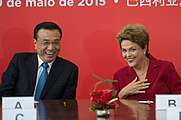 May 2015, Li meets the Brazilian president Dilma Rousseff.
May 2015, Li meets the Brazilian president Dilma Rousseff._02.jpg) November 2018, Li meets the Russian president Vladimir Putin.
November 2018, Li meets the Russian president Vladimir Putin.
Reduction of bureaucracy
Li is especially critical of unnecessary government bureaucracy, particularly at the grassroots level. He believes that many lower-level officials fail to provide services to the public in an effective manner. Regarding his disdain for the matter, Li's many quotable anecdotes have become viral. Li referred to a case in which a citizen filling out a form to travel overseas had to write down an emergency contact (the citizen put down their mother as the contact), and the government official overseeing the matter asked the citizen to provide a notarized document to "prove your mom is your mom."[33] Li called this incident "absolutely preposterous." In another case, he referred to a grassroots civil servant who asked for proof that a one-year old does not have a criminal record in order to deliver a government service.[34] In yet another case, Li referred to a senior citizen applying for welfare benefits being forced by government employees to provide proof that "they are still alive." Regarding the latter two incidents, Li said, "this is not a joke, it's all real!"[34]
Manufacturing and technological innovation
Li Keqiang, a vocal proponent of bolstering technological innovation, lamented how China was producing 800 million tons of steel annually but still importing the specialized type of stainless steel needed to make the better tip cases. The Chinese premier's comments caused consternation in China's pen industry – which was not used to being the topic of mainstream political conversation. These pen companies were once happy to manufacture shoddy pens that were sometimes exported abroad as cheap knockoffs of better brands. Now, they were being told that they were expected to do something more.[35]
He reiterated this point frequently during public appearances, adding that pens using domestically produced parts felt inferior to foreign ones. The ballpoint pen became a potent symbol for perceived flaws in China's economy and technological capabilities. "That's the real situation facing us", Li said at a meeting with economists in December 2015. "We cannot make ballpoint pens with a smooth writing function". In 2016 Premier Li Keqiang went on national television and bemoaned the failure of his country to produce a good quality version of this seemingly-simple implement. Locally-made versions felt "rough" compared to those from Germany, Switzerland and Japan, Mr Li complained.
On one level, whether China can make a great pen is not hugely important in the scheme of things. High-tech and innovative manufacturing lie at the heart of the central government's Made in China 2025 programme - designed to help domestic growth. Relatively low-value items, like ballpoint pens, have not been a priority. But the pen-conundrum was a symbolic one. About much more than pens, his goal is to encourage independence and innovation. The pen tip issue was first brought into the spotlight by Li Keqiang, offering an insight into a major issue confronting Chinese manufacturers – weak competitiveness in core technology. State-owned Taiyuan Iron and Steel (Group) Co plans to mass-produce ballpoint pen tips and replace imports in two years, company officials said in 2017.[36]
Xi–Li Administration
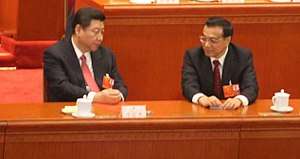
At the Third Plenum of the 18th Central Committee held in the fall of 2013, the Communist Party announced far reaching economic and social reforms. However, the document outlining the reforms was drafted under the leadership of Xi, Liu Yunshan and Zhang Gaoli, and Li was ostensibly not involved in preparing the document. This departure from convention (Wen Jiabao was the principal drafter of documents behind the reforms announced at the Third Plenum of 2003) led to speculation that Li was becoming marginalized in the new administration, and that the widely touted "Xi-Li Administration" in fact did not exist, as power was increasingly being centralized under the hands of Xi as the General Secretary of the Communist Party of China.[37]
Following the Third Plenum of 2013, Xi amassed a series of leadership roles on four new powerful supra-ministerial bodies overseeing "comprehensively deepening reforms", the internet, military reform, and also the National Security Commission. The "deepening reforms" leading group was said to be encroaching on the affairs in the economic realm normally handled by the Premier, and was seen as having the effect of reducing Li's institutional power. However, Li appeared in official press releases as Xi's foremost lieutenant, being named Vice Chairman of the National Security Commission,[38] in addition to becoming the deputy leader of leading groups on "deepening reforms", internet security, and the economy and finance.
On 18 March 2018, Li was reappointed Premier of China after receiving 2,964 votes in favour and just two against by the National People's Congress.[39]
Coronavirus outbreak
Li has urged efforts to prevent and control the novel Coronavirus pandemic.[40] Since January 2020, he is in charge of prevention and control of the epidemic.[41] On 27 January, Premier Li Keqiang visited Wuhan to direct the epidemic prevention work.[42]
Personal life
Li is married to Cheng Hong, a professor at Capital University of Economics and Business in Beijing. His father-in-law was once the deputy secretary of the Communist Youth League Central Committee. He speaks conversational English.[43]
Li suffers from health problems, although his voice remains energetic. He abstains from drinking alcohol. According to a report published in Hong Kong, "Li suffered from hepatitis B when he was released to rural areas during the period of cultural revolution, and his liver function declined, causing kidney disease." This caused his complexion to darken. [44]
Publication
Li, Yining; Meng, Xiaosu; Li, Yuanchao; Li, Keqiang (December 2018). The Strategic Choice for China's Prosperity (English Version). Translated by Shi, Guangjun; Jiang, Hongxing. Singapore: South Ocean Publishing House. . Written especially for the 40th anniversary of China's Reform and Opening-up.
See also
- Xi–Li Administration
- Li Keqiang Index
- League Faction
Notes
- Li's title has been variously translated as "Executive Vice Premier" or "First Vice-Premier", though the practice of making explicit reference to the Vice Premier's rank has gradually been phased out since Deng Xiaoping last assumed the title of "First Vice Premier" during the Cultural Revolution. In state media, Li has almost always been referred to as simply the "Vice Premier".
References
- "How to Say: Chinese leaders' names". Magazine Monitor. BBC. 15 November 2012. Archived from the original on 26 June 2018. Retrieved 23 June 2018.
- "China's new top Party leaders make debut". China.org.cn. 15 November 2012. Archived from the original on 17 November 2012. Retrieved 22 November 2012.
- “Made in China 2025” plan unveiled to boost manufacturing Archived 25 July 2018 at the Wayback Machine China News Service, May 2015
- "合肥市第八中学_百度百科". Archived from the original on 12 January 2015. Retrieved 8 January 2015.
- 《多维月刊》:李克强出身非平民,成长靠恩师(2). Dwnews.com (in Chinese). 28 November 2008. Archived from the original on 1 December 2008. Retrieved 18 March 2013.
- "Profile: Chinese First Vice Prime Minister Li Keqiang". Radio Free Europe. 7 November 2012. Archived from the original on 1 November 2013. Retrieved 26 August 2013.
- 总理恩师厉以宁 [Li Yining: teacher of the premier] (in Chinese). Sohu. Archived from the original on 21 February 2015. Retrieved 20 February 2015.
- Xiaobing Li (2015). Modern China. ABC-CLIO, Santa Barbara, California. p. 104. ISBN 978-1610696258.
- "Duowei: Li Keqiang helps Henan fight off the poverty". Chinese Newsnet (in Chinese). 10 June 2007. Archived from the original on 2 January 2013. Retrieved 18 March 2013.
- "Power Players: Li Keqiang". The Diplomat. 28 September 2012. Archived from the original on 26 August 2010. Retrieved 18 March 2013.
- Maidment, Paul (28 January 2010). "China's Li Delivers A Polished Future". Forbes. Archived from the original on 22 July 2011. Retrieved 3 September 2017.
- Li, Keqiang. "Davos Annual Meeting 2010 – Special Address by Li Keqiang". World Economic Forum. Archived from the original on 17 September 2012. Retrieved 4 June 2010.
- Li, Keqiang. 关于调整经济结构促进持续发展的几个问题 [Questions Concerning Changes to China's Economic Structure]. Qiushi. Archived from the original on 4 June 2010. Retrieved 1 June 2010.
- Society Global Times Archived 8 June 2010 at the Wayback Machine
- Xinhua News Agency (11 October 2010). "China's vice premier urges accelerating industrialization, urbanization". Xinhuanet. Archived from the original on 14 October 2010. Retrieved 22 October 2010.
- Wang, Yue. "This Chinese Policeman Built The World's Top Gay Dating App, Now He Wants More International Users". Forbes.com. Archived from the original on 15 October 2018. Retrieved 15 October 2018.
- Horton, Nick. "Chinese businesses eye purchasing power of LGBT community". Marketwatch.com. Archived from the original on 16 October 2018. Retrieved 15 October 2018.
- "China confirms Li Keqiang as premier". BBC. 15 March 2013. Archived from the original on 15 March 2013. Retrieved 15 March 2013.
- "Li Keqiang named Chinese premier, government's second most powerful post". CNN. 15 March 2013. Archived from the original on 1 November 2013. Retrieved 17 March 2013.
- "Who's Who in China's New Government Leadership Lineup". Bloomberg. 16 March 2013. Archived from the original on 21 March 2013. Retrieved 16 March 2013.
- DING QINGFEN (26 March 2013). "Premier Li Keqiang focuses on consumption". China Daily. Archived from the original on 1 November 2013. Retrieved 1 April 2013.
- "Premier Li calls for courage, wisdom in upgrading economy". Xinhua. 31 March 2013. Archived from the original on 1 November 2013. Retrieved 1 April 2013.
- "Li Keqiang". Forbes. 18 April 2012. Archived from the original on 30 October 2013. Retrieved 18 March 2013.
- "Keqiang ker-ching: How China's next prime minister keeps tabs on its economy". The Economist. 9 December 2010. Archived from the original on 4 January 2015.
- "Likonomics: what's not to like". The Economist. 1 July 2013. Archived from the original on 2 May 2017. Retrieved 13 July 2017.
- Chen, George (7 April 2014). "Forget 'Likonomics', it's all about economic stimulus in China again". South China Morning Post. Archived from the original on 22 December 2014. Retrieved 23 January 2015.
- 学者称李克强style为专家治国 [Scholars say Li Keqiang style is an expert] (in Chinese). Duowei News. 21 July 2014. Archived from the original on 23 January 2015.
- "Chinese premier visits India". Al Jazeera English. 19 May 2013. Archived from the original on 14 March 2016. Retrieved 26 August 2013.
- "Chinese PM vows to build trust with India". Al Jazeera English. 19 May 2013. Archived from the original on 9 August 2013. Retrieved 26 August 2013.
- "Chinese premier hopes for more fruits in friendship with Pakistan". Xinhuane. 24 May 2013. Archived from the original on 15 August 2013. Retrieved 26 August 2013.
- Li visits four countries Archived 25 May 2013 at the Wayback Machine China Daily
- McMaster, Herbert Raymond. "How China Sees the World". The Atlantic. The Atlantic. Retrieved 8 May 2020.
- "Archived copy" 李克强:证明"你妈是你妈"是天大笑话. Duowei News. 6 May 2015. Archived from the original on 18 May 2015. Retrieved 14 May 2015.CS1 maint: archived copy as title (link)
- "Archived copy" 李克强屡斥"奇葩"证明 简政放权再推进. Chinanews. 12 May 2015. Archived from the original on 18 May 2015. Retrieved 14 May 2015.CS1 maint: archived copy as title (link)
- Atkinson, Simon (15 October 2018). "Why the ballpoint pen has eluded China". BBC News. Archived from the original on 24 November 2018. Retrieved 15 October 2018.
- State-owned Taiyuan Iron and Steel (Group) Co plans to mass-produce these ballpoint pen tips and replace imports in two years, company officials said on Tuesday.
- 习刘张起草三中 李克强未参与引争议 [Xi Liu Zhang drafted three middle schools Li Keqiang did not participate in the dispute]. Duowei News (in Chinese). 17 November 2013. Archived from the original on 23 January 2015.
- "Xi Jinping to lead national security commission". China Daily. 24 January 2014. Archived from the original on 3 February 2014. Retrieved 31 January 2014.
- "Li Keqiang endorsed as China's premier; military leaders confirmed". Scmp.com. 18 March 2018. Archived from the original on 27 August 2019. Retrieved 15 October 2018.
- "Chinese premier stresses curbing viral pneumonia epidemic". China Daily. Beijing: Xinhua News Agency. 21 January 2020. Archived from the original on 22 January 2020. Retrieved 22 January 2020.
- "China to extend Spring Festival holiday to contain coronavirus outbreak". Xinhua News Agency. Beijing. 26 January 2020.
- "Chinese Premier Li visits Wuhan, epicenter of virus outbreak". Reuters. Beijing. 27 January 2020. Archived from the original on 27 January 2020. Retrieved 27 January 2020.
- Li Keqiang's Wife and In-laws Archived 22 January 2013 at Archive.today Duowei Monthly
- Masaru, Soma. "<China is now! > Prime Minister Li Keqiang's health anxiety theory, Beijing citizens are more interested than PM2.5-A risk factor in China?". Record China. Record China. Retrieved 2 June 2020.
External links
| Wikimedia Commons has media related to Li Keqiang. |
| Wikiquote has quotations related to: Li Keqiang |
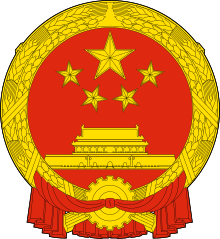
.jpg)
_01.jpg)
